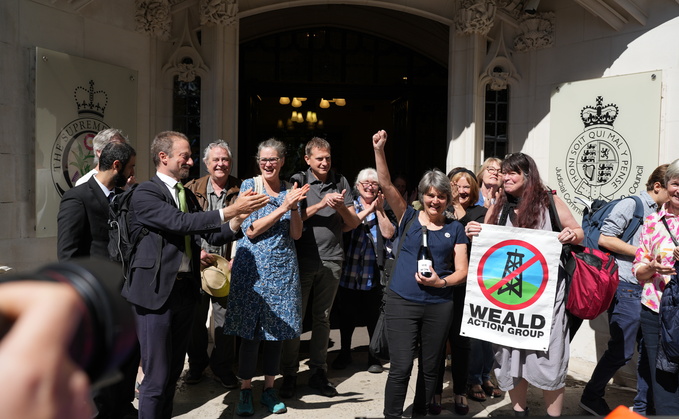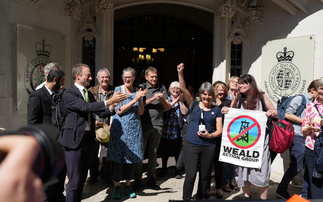Members of the Weald Action Group celebrate outside the Supreme Court | Credit: Friends of the Earth
Supreme Court ruling could have major implications for planned new fossil fuel project in the UK, including controversial Cumbria coal mine
The UK's highest court today ruled Surrey County Council failed to consider the full climate impact of an oil drilling project before granting it planning consent, in a landmark judgement that could have major implications for proposed new fossil fuel projects in the UK.
Horse Hill Developments Ltd had applied to the council for planning permission to expand oil production from an existing oil well site at Hose Hill near Horley in Surrey, which would have involved drilling oil from six wells over a 20-year period.
Friends of the Earth, which has been supporting the Weald Action Group in its Supreme Court appeal against the project, claimed the project could be expected to produce 3.3 million tonnes of crude oil over the next two decades, generating over 10 million tonnes of CO2 as a result.
However, the developer had argued the environmental impact assessment (EIA) for the project - a legal requirement for securing planning consent - should be confined to considering only the direct greenhouse gases emitted at the site during oil drilling, and not emissions generated from the use of the resulting oil elsewhere.
That argument - which is widely deployed across the oil and gas industry to justify claims fossil fuel companies are on track to meet internal net zero goals - was accepted by Surrey County Council, which duly granted planning permission to the project in September 2019.
But local campaigners Weald Action Group challenged the decision, beginning a five-year legal saga that began with an application for a Judicial Review that was initially rejected by the High Court and the Court of Appeal, before the case was finally brought before the Supreme Court.
Today, judges on the Supreme Court voted by a three to two majority to uphold Weald Action Group's appeal, ruling the council's initial decision to grant planning permission to the project unlawful because it failed to take into account the Scope 3 value chain emissions that would result from the project.
"The emissions that will occur on combustion of the oil produced are 'effects of the project' because it is known with certainty that, if the project goes ahead, all the oil extracted from the ground will inevitably be burnt thereby releasing greenhouse gases into the Earth's atmosphere in a quantity which can readily be estimated," today's judgement states.
"Consequently, the council's failure to assess the effect on climate of the combustion of the oil that would be produced from the proposed well site means that its decision to grant planning permission for the project was unlawful."
A spokesperson for the Department for Energy Security and Net Zero (DESNZ) said the government would "carefully consider the impact of the ruling", but "it would not be appropriate to comment further".
Today's decision was immediately hailed as a landmark ruling, which could have huge implications for any fossil fuel developer seeking planning permission for new projects in the UK. Campaigners argued the precedent meant fossil fuel projects should have a much higher bar to clear when seeking planning permission, as the emissions generated from the burning of fossil fuels should be taken into account, alongside those generated during extraction.
Weald Action Group campaigner Sarah Finch, who brought the legal challenge, said she was "absolutely over the moon to have won this important case".
"The Weald Action Group has always believed it was wrong to allow oil production without assessing its full climate impacts, and the Supreme Court has shown we were right," she said. "This is a welcome step towards a safer, fairer future. The oil and gas companies may act like business-as-usual is still an option, but it will be very hard for planning authorities to permit new fossil fuel developments - in the Weald, the North Sea or anywhere else - when their true climate impact is clear for all to see."
Today's ruling could have implications for the controversial plan to develop a new coking coal mine in Cumbria, as well as government plans to issue new oil and gas drilling licenses for the North Sea. The Cumbria coal mine plans have been approved by the government, but are facing a separate legal challenge from environmental groups, which similarly argue the Scope 3 emissions impact of the project was not adequately considered by the local council and the government when granting planning permission.
A High Court hearing for the Cumbria coal mine case had been due to take place last Autumn, but was postponed pending the Supreme Court's decision on the Horse Hill oil well case. The High Court previously indicated a new date for the Cumbria coal mine case hearing would likely be slated for at least 10 weeks after the Supreme Court's judgement in the Horse Hill case.
Friends of the Earth lawyer Katie de Kauwe described today's ruling as "a huge boost to everyone involved in resisting fossil fuel projects".
"This historic ruling is a watershed moment in the fight to stop further fossil fuel extraction projects in the UK and make the emissions cuts needed to meet crucial climate targets," she said. "This judgment will make it harder for new fossil fuel projects to go ahead. They can no longer claim that downstream emissions are someone else's problem. Now, when fossil fuel companies apply for planning permission, it follows from the Supreme Court's judgment, that the end-use emissions must be considered by the planning authority."
A number of oil and gas companies have also been seeking licences to drill new oil and gas wells in the North Sea, such as the controversial Rosebank project off the coast of Shetland which was granted development and production consent last year.
Rachael Davidson, environmental lawyer at global law practice Charles Russell Speechlys, said the Supreme Court's "unexpected" ruling "sets a clear precedent for fossil developments where the end use of the product is clear and those resulting, inevitable, greenhouse gas emissions will need to be assessed".
"As for other developments where the product has any number of possible end uses - for example, steel - the impact of the decision is tempered as the Court considered that a view could be reasonably taken that no meaningful assessment or estimate can be made of what emissions will ultimately result from its use and therefore downstream effects may be scoped out in some cases," she added. "The Supreme Court judgment has, however, set a significant precedent for future EIA development; importantly, any decision to scope out downstream effects from an environmental assessment will need to be supported with robust reasoning."
The issue of whether the UK should allow new oil and gas projects has become a major dividing line during the General Election campaign, with the Conservatives pledging to hand out further drilling licences in the North Sea, while Labour has said it would halt any new licensing rounds, while allowing projects that have already secured licenses to proceed.
Bob Ward, policy and communications director at LSE's Grantham Research Institute on Climate Change and the Environment, said the Supreme Court's ruling today could present a fresh challenge to other oil projects that have already secured planning consents, such as Rosebank, and those political parties which have backed new UK fossil fuel extraction.
"This ruling will put further pressure ahead of the election on those parties, particularly the Conservatives, that have been promoting further development of fossil fuels in the North Sea, against the advice of experts and contrary to the scientific evidence," he said.
The decision comes as the Conservatives have faced fierce criticism from green groups, who have argued plans to approve new fossil fuel projects run counter to the commitment the UK signed up to at last year's COP28 Climate Summit in Dubai to support the transitioning away from fossil fuels in energy systems. But the government has argued new projects are necessary to maintain energy security while the UK's net zero transition progresses.
You can now sign up to attend the fifth annual Net Zero Festival, which will be hosted by BusinessGreen on October 22-23 at the Business Design Centre in London.











